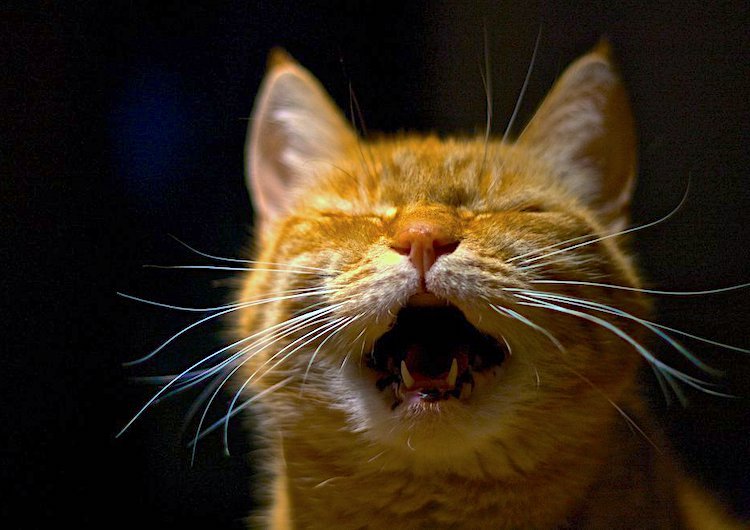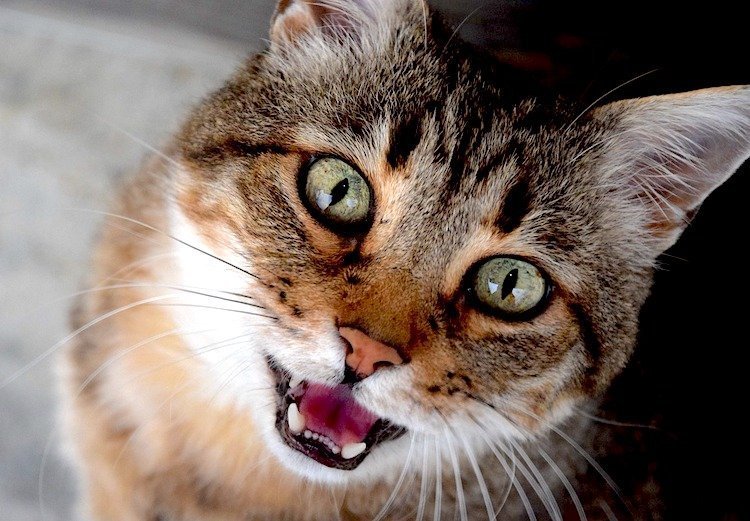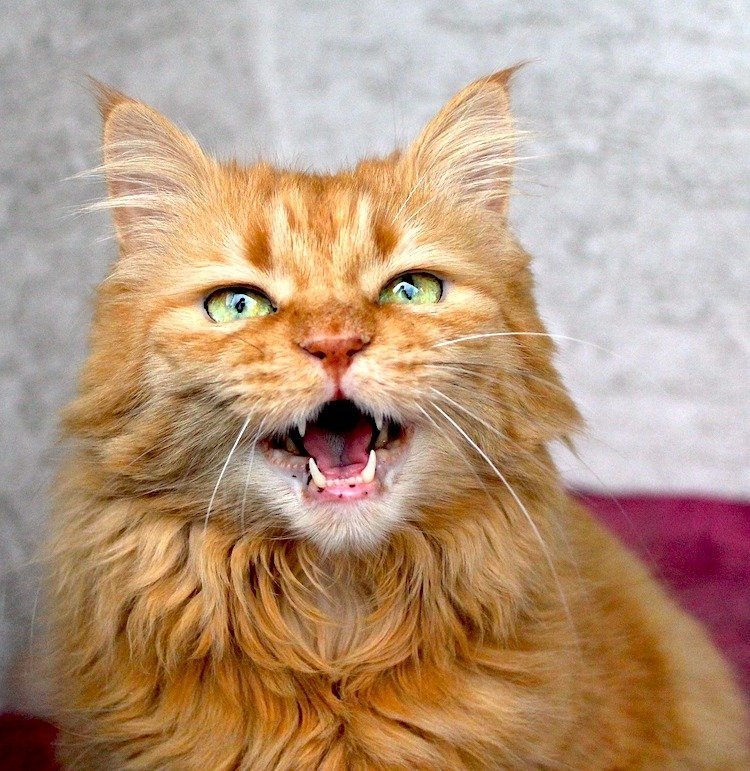
This pet health content was written by a veterinarian, Dr. Debora Lichtenberg, VMD. This article was originally published in 2015 and is regularly updated. It was reviewed for accuracy by Dr. Pippa Elliott, BVMS, MRCVS, and was last updated on June 11, 2024
If you have questions or concerns, call your vet, who is best equipped to ensure the health and well-being of your pet. This article is for informational purposes only and is not a substitute for professional medical advice, diagnosis, or treatment. See additional information.

- Understanding Why is Your Old Cat Yowling
- Common Complaints When an Old Cat Meows All the Time
- Concerns in Old Cat Yowling
- Top 6 Reasons an Old Cat Meows All the Time
- Why You Need to Take Your Cat to the Veterinarian
- How Your Vet Will Find the Problem
- Central Nervous System Problem (Brain Tumor)
- Cognitive Dysfunction
- Medications
- Lifestyle Suggestions
- Final Thoughts: When Your Old Cat Meows All the Time
- Frequently Asked Questions (FAQ)
Understanding Why is Your Old Cat Yowling
Is that a new techno sound upstairs, or is your old cat yowling just gone over the brink?
The idea of a cat yowling at all hours of the night and waking up the house may sound funny, but senior cats who begin to yowl like this may be suffering from something serious — and treatable.
Excessive vocalization in cats is more common at night — although some old cats yowling can vocalize at any time. Keep reading to learn why this may be happening
Common Complaints When an Old Cat Meows All the Time
- “She’s keeping me up at night!”
- “I think my senior cat is in terrible pain.”
- “At 3 in the morning, this old cat starts yowling. What’s wrong with her?”
- “I got a complaint from my landlord about the cat’s constant yowling. Now what do I do?”

Concerns in Old Cat Yowling
Some people who bring their cat to the vet for this are worried only about the cat’s well-being. Other people? They’re worried about their own lack of sleep.
We used to think these cats had become senile or demented and didn’t believe there was a lot we could do. Now we know there is a direct correlation between certain medical and neurologic conditions, cognitive dysfunction, and excessive vocalization in cat yowling.
You have to be willing to have your vet do a thorough workup, which is important for a geriatric cat anyway and have patience to do some trial drug therapies. This is one area where “traditional” medicine can work nicely with more naturopathic treatments for cat yowling.
Top 6 Reasons an Old Cat Meows All the Time
Sensory Decline
- Vision Loss: Older cats may develop cataracts or other eye issues, leading to decreased vision. Symptoms include bumping into objects or reluctance to move in unfamiliar spaces.
- Hearing: Hearing impairment can cause confusion and increased vocalization as cats struggle to understand their environment.
- Smell Loss: A reduced sense of smell can affect appetite and overall comfort.
- Note: Regular vet check-ups can help identify and manage sensory decline early.
High Blood Pressure
- Causes: Often linked to kidney disease or hyperthyroidism in older cats. Symptoms include sudden blindness, seizures, and increased vocalization.
- Treatment: Medications such as amlodipine can effectively manage hypertension.
- Note: Routine blood pressure monitoring in senior cats is crucial for early detection.
Hyperthyroidism
- Causes: An overactive thyroid gland leads to increased metabolism. Symptoms include weight loss, increased appetite, hyperactivity, and loud meowing.
- Treatment: Options include medication (methimazole), radioactive iodine therapy, or surgery.
- Note: Early treatment can significantly improve quality of life and reduce symptoms.
Pain
- Types: Chronic pain from dental disease, arthritis, gastrointestinal issues, UTI pain, or neurological pain can cause excessive vocalization.
- Assessment: Pain can be challenging to diagnose; vet may use trial medications to identify and manage pain.
- Note: Pain management should be tailored to the individual cat’s needs and condition.
Central Nervous System Disease
- Causes: Brain tumors, such as meningioma, can cause behavioral and neurological changes, including yowling.
- Symptoms: Circling, seizures, depression, or dullness.
- Treatment: Advanced imaging (CT/MRI) for diagnosis; surgery or medical treatment can help.
- Note: Prompt veterinary intervention can improve outcomes.
Cognitive Dysfunction
- Causes: Similar to Alzheimer’s in humans, leading to confusion, disorientation, and increased vocalization.
- Symptoms: Nighttime yowling, aimless wandering, and changes in behavior.
- Treatment: Medications (e.g., selegiline), supplements, and lifestyle changes can help manage symptoms.
- Note: Creating a stable and stimulating environment can reduce anxiety and confusion.

Why You Need to Take Your Cat to the Veterinarian
You may want to just “fix” the cat yowling so you can sleep. But finding the source of the screeching may also be a lifesaver for your cat.
These diseases can be dangerous if left untreated. So finding and treating the underlying cause can do a lot more than give you back a good night’s sleep: It can add happy years to your cat’s life.
How Your Vet Will Find the Problem
When someone brings one of these cats to my vet clinic, I start with a thorough physical:
- I check the cat’s eyesight, senses, oral cavity, body weight, cardiac, etc.
- Then I get full blood work, a urinalysis, and a reliable blood pressure reading.
- If I find hyperthyroidism or hypertension, we treat these conditions medically and see if we make an improvement. This is the fairly easy part of the diagnostic plan.
Dental or Arthritis Pain
Pain assessment is more difficult. Often, we find severe dental disease in the physical exam. Arthritis may or may not be obvious. Are these conditions causing the yowling? Trial pain medication may be prescribed to see if arthritic or neurologic pain improves. A dental procedure may be recommended if the cat is in a stable state for anesthesia.
Other Sources of Pain
Other sources of pain or chronic inflammation may not be as obvious. Cats living with subacute pain for a long time may be very stoic. Weight loss in an older cat is a tip-off that there is a problem. The workup may reveal pain caused by GI disease, pancreatitis, neoplasia, and so on, but the level of pain itself is still subjective.
Central Nervous System Problem (Brain Tumor)
There may be clues in a neurological exam that the cat’s excessive vocalization is caused by a central nervous system problem such as a brain tumor. These cats may be circling, having seizures, or acting depressed or dull. A definitive diagnosis needs more advanced imaging, such as a CT or MRI, and these cats can do very well with surgery. Often, we tentatively diagnose a meningioma based on the symptoms. Medical treatment can be of some help.
Cognitive Dysfunction
If most of the testing on your geriatric cat is normal up to this point, your cat may be suffering from cognitive dysfunction. Because of an aging brain, your pet may have a syndrome not unlike Alzheimer’s in humans. There is no definitive test. I prescribe a number of medications and supplements to see if we can stop or decrease the yowling.
Medications
For many people, giving medicine to a cat is hard work. Some cats are resistant to getting a single pill, let alone up to 4 or 5 pills a day. If my patient is a hyperthyroid, hypertensive cat with cognitive dysfunction, I may need to prioritize which meds I prescribe first.
Cognitive Dysfunction Treatments
- Selegiline (not approved but in common usage)
- SAMe and other antioxidants
- Nu-Cat Senior (more on this below)
- Fish oil
- Melatonin
- Tranquilizers
- SSRIs (antidepressants)
Lifestyle Suggestions
- Diet change
- Acupuncture
- Regular exercise and sensory stimulation
- A nightlight
Final Thoughts: When Your Old Cat Meows All the Time
There’s a lot of help out there. But zeroing in on the most important problems and medicating appropriately can be tough.
Don’t give your cat supplements without checking with your vet.
The drugs mentioned above may not all be compatible, and your cat may have particular medical problems that put some of these drugs on the “caution” list.
By no means is this an exhaustive treatment list. If people have the finances, for example, I like to treat hyperthyroidism with radioactive iodine therapy.
You probably can’t go wrong with a low-carb diet, a geriatric supplement like Nu-Cat Senior Multivitamin for Cats, a calm and orderly household, and lots of love and affection for your aging cat.
Beyond that, check with your vet.
Frequently Asked Questions (FAQ)
Why is my cat yowling loudly?
Your cat may be meowing loudly due to hunger, stress, pain, or seeking attention.
Why is my old cat yowling loudly?
An old cat yowling loudly may be experiencing cognitive dysfunction, pain, or sensory decline.


